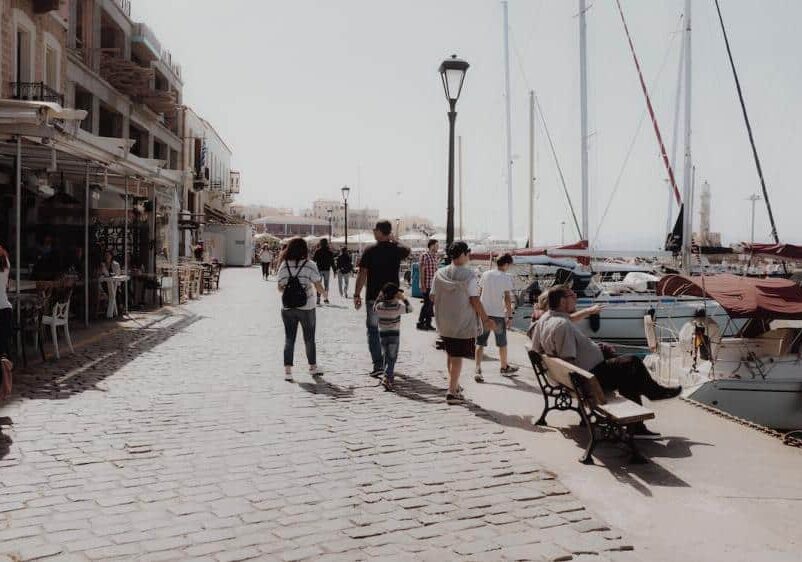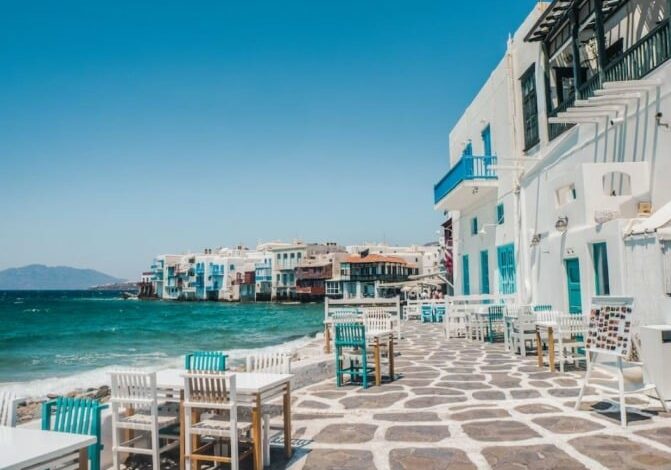If you’re considering moving abroad as an American expat, Greece offers a captivating blend of ancient history, modern amenities, and a relaxed Greek way of life. While Greece is becoming an increasingly popular expat destination, there are many Americans living in Greece already, enjoying the benefits of the country’s Golden Visa program, its perks as a tax residence, and its more laid-back lifestyle.
American Expats in Greece

Whether you’re a temporary traveler or an aspiring American expat with an eye on Europe, Greece has it all: Affordable accommodation, rich history, year-round warm weather, amazing food, and hospitable locals.
Greece joined the European Union in 1981, and its infrastructure has seen tremendous improvements since then. Before this, Greece was relatively underdeveloped compared to other European countries, where many Greeks and foreign residents frequently waited over two years to get a phone line.
However, living standards have risen since joining the EU, and the infrastructure has undergone significant enhancements. Whether you live in Athens or on a remote island in Greece, the improvements in transportation, communication, and public services are evident.
Pros and Cons of Living in Greece as an American
Greece is a captivating country with many attractions, including historical buildings and beaches with black sand. The standard of living in Greece is good, and Americans who earn an average US salary or pension will enjoy a relatively luxurious lifestyle in this Mediterranean country.
Cost of living in Greece
Pro: Greece is generally affordable
Greece has a generally inexpensive cost of living, though prices vary by region, with the mainland typically being less expensive than the islands. Due to the reasonable prices for transportation, housing, and essential products, it is cheaper than the United States and most other countries elsewhere in Western Europe.
A foreigner on a tight budget can get by in Greece on as little as $2,000 per month. The country has affordable healthcare and private health insurance options, contributing to its reputation as a budget-friendly destination for foreigners.
Con: Tourist areas are expensive
Greece has a relatively low cost of living, but prices are raised in the most popular tourist destinations to profit from the seasonal influx of tourists. Living on a lesser-known island or city sees drastic reductions in living costs for practically everything, including housing and food.
Furthermore, real estate investments in popular tourist centers and large cities require foreign investors to make a higher minimum investment to qualify for the Greece Golden Visa program.
Accommodation in Greece
Pro: There are many rental options available
The selection of options may vary depending on where expats choose to live. Stone farmhouses are prominent in the countryside, while villas and apartment buildings are prevalent in urban areas. There are also cottages and freestanding, semi-detached homes all around the country.
With so many possibilities available, Americans living in Greece should be able to find housing that fits their budget and preferences.
Con: Accommodation varies in quality
Period housing is a common sight in Greece. Before purchasing a house to live in or as a qualifying financial investment for the Golden Visa to obtain a permanent residence permit, expats should visit the property and evaluate the building’s age and condition. If expats inadvertently purchase a dilapidated property, they might risk incurring unanticipated remodeling and restoration fees.
Greek Lifestyle
Pro: The locals are friendly
US expats find that most Greeks are exceedingly hospitable and welcoming. Greek people are known for hospitality and cherish connections, especially over a good meal. They are also proud of their heritage and culture. Any attempts by expats to communicate with the locals in Greece will be warmly welcomed.
Pro: Relaxed pace of life
The Greek laid-back lifestyle appeals to many American senior citizens who wish to live a slower pace of life in their golden years. The Greek population typically doesn’t rush through their daily tasks, and although they tend to work hard, they appreciate life’s little joys. For residents used to a fast-paced world, especially at work, this may take some time to get used to.
Pro: The weather in Greece is lovely
Those living in Greece enjoy a warm Mediterranean climate throughout the year. Even though rain occasionally interrupts the ever-lasting sunshine, there aren’t many days with rain. Summers are hot but are tempered by a refreshing sea wind, and winters are pleasant and bright.
Pro: Delicious food
A source of pride for the Greek citizens is that the country is a foodie’s paradise. Greece has many dishes featuring wonderful fresh local foods, delicious seafood, and meats. Greek’s Mediterranean diet is also known for being extraordinarily healthy, which contributes to the country’s long average life expectancy.
Pro: It is a relatively safe country
Greece has a low crime rate, and most people feel comfortable walking the streets day or night. Expats generally feel safe, although practicing standard safety measures is advisable.
Con: Expats must navigate the language barrier
While many Greeks speak English in popular tourist destinations, Americans seeking a permanent residence permit in Greece would enjoy a better living experience if they decided to learn Greek.
Furthermore, those seeking employment opportunities with a Greek employer would greatly benefit from acquiring proficiency in the Greek language, and a Greek employer may only consider applicants with a reasonable command of Greek. However, the Greek language has distinct spoken and written varieties and regional idioms; therefore, learning this language might be challenging for most expats.
Greek economic outlook
Pro: Investment opportunities
Greece has undergone economic reforms, attracting foreign investors with promising opportunities across various sectors. Notably, the Greece Golden Visa program offers a pathway to residency by investing in real estate, making Greece an appealing destination for those seeking European residency. Additionally, the strategic location of Greece within the European Union and bordering the Middle East, Africa, and mainland Europe facilitates business opportunities and trade relations.
Pro: Tax optimization
The Greece Non-Dom Tax regime offers a favorable tax environment for residents in Greece, making it a notable pro for Americans considering living in Greece. The country has a double taxation treaty with the United States, so US citizens eligible for the Non-Dom Tax regime can avoid double taxation and take advantage of the tax benefits offered.
Con: Remnants of the financial crisis
The 2008 Financial Crisis left a lasting impact on the country. The crisis resulted in a severe economic downturn, soaring unemployment rates, and widespread austerity measures, with the subsequent bailout of the Greek economy. While the country has made efforts towards recovery, the repercussions of the economic crisis are still felt, and Greece continues to grapple with economic challenges.
The Greek Language: Is It All Greek to You?

Nevertheless, one of the significant obstacles for Americans living in Greece is the difficulty of learning the Greek language, as 99 percent of the people in Greece speak Greek–the country’s official language.
The Greek language is challenging for English speakers since it has its own alphabet, a wide range of intonations or sounds, and intricate grammar. It can take several years to reach a conversational level. But no need to worry, as Greece offers various online classes and has many well-known language institutions available to get you started in learning Greek.
Is living in Greece more expensive than in the US?
Numerous comparisons show that Greek living expenses are less than US living expenses. For a single person in Greece, the average cost of living in Greece is about $880 per month, without rent. From housing and dining out to the healthcare system and even hair care, the average cost of living in Greece is much lower than in the United States and other countries in Europe.
Below is a comparison of Greece’s average cost of living versus the United States for several core expenses.
Item | Greece | United States |
Rice | $2.42 | $4.64 |
Beef (1kg) | $13.44 | $16.12 |
Chicken (1kg) | $10.26 | $12.31 |
Public transport monthly pass | $32.64 | $80 |
Basic utilities | $237.92 | $214.02 |
Mid-range restaurant for two | $54.40 | $75.99 |
Concerning accommodation, Americans living in Greece benefit from a much lower cost of renting real estate and buying property.
Accommodation | Greece | United States |
Rent for a one-bedroom apartment (city center) | $550 | $1,840 |
Rent for a three-bedroom apartment (city center) | $900 | $3,080 |
Rent for a one-bedroom apartment (outside the city center) | $440 | $1,500 |
Rent for a three-bedroom apartment (outside the city center) | $770 | $2,490 |
Purchase price per m2 (city center) | $2,870 | $7,800 |
Purchase price per m2 (outside the city center) | $2,470 | $5,300 |
According to Numbeo, life in Greece is substantially less expensive overall. With that said, gas prices are higher on average in Greece at $2.14 per liter compared to $0.97 per liter in the United States.
Moving Around Greece
There is an abundance of transportation alternatives in Greece, which makes getting around the country straightforward. You may take a train, tram, subway, bus, or cab if you are traveling by land in Athens. Although a new metro system is due to open in Thessaloniki in 2024, buses are the primary mode of transportation in Greece, departing from most cities and small towns.
Greece has a large number of islands, and ferries are widely used as a means of transportation across them. The country has numerous ports to transport both passengers and cargo. Some people even prefer boarding a ferry to flying across Greece.
Is it possible to drive in Greece on an international permit?
According to Greek regulations, foreign drivers must possess both an IDP (International Driver’s Permit) and a state-issued driver’s license. A Greek driver’s license is also required if you plan to stay in Greece for longer than six months. Contact the nearest Ministry of Transport and Communications in Greece to apply for a Greek license. You must prepare to pay taxes, namely a stamp tax of €18 and a printing cost of €30 to receive it.
Is Greece Safe?
Greece has a relatively low crime rate. The nation ranked 60th on the 2023 Global Peace Index, significantly higher than the United States ranking of 131st. The most frequent crimes in Greece are non-violent ones like pickpocketing and handbag stealing. Expats living in Greece and foreigners who visit Greece on a tourist visa generally experience a safe environment.
How are Americans moving to Greece?
The Greece Golden Visa program became the primary pathway for Americans moving to Greece. The advantage of the program is it allows investors to purchase property and obtain permanent residency. The main requirement is to buy a property for at least €250,000.
However, the program’s popularity has seen the minimum investment rise to €500,000 for purchases in specific regions, including northern and central provinces, the South Athens Attica region, and the municipalities of Thessaloniki, Mykonos, and Santorini.
For US expats uninterested in real estate investment, the Greek government provides several alternatives to qualify for the program, including:
- €400,000 investment in a Greek company
- €500,000 deposit in a Greek bank account
- €500,000 purchase of government bonds
Where do Americans live in Greece?
The Greek economy has seen substantial growth, and expats buying Greece Golden Visa properties have played a notable role in contributing to the country’s economic resurgence, in addition to expats themselves benefiting from potentially high financial returns.
Greece’s numerous islands and peninsulas provide a variety of living options. Greece has no limitations on foreigners purchasing real estate there. Therefore, Americans own property in various cities and regions of the country.
Thessaloniki
One of the cheapest cities in Greece is Thessaloniki, the country’s second-largest metropolis. Although the city is in the country’s north, it still borders the sea. Thessaloniki is a port city situated on the low slopes of a protected bay, making it a hub for fishing boats, large yachts, and adventurous swimmers.
Thessaloniki has a more laid-back vibe than Athens, where people are exposed to the capital’s hectic, frenetic atmosphere. The art of doing nothing, eating delicious food, and some inspiring Greek culture are all presented in Thessaloniki’s everyday routine, making this city one of the best places for expats to live in Greece.
The influence of the Roman, Byzantine, Ottoman, and Greek empires demonstrates the city’s rich cultural heritage. As a result, the city is culturally diverse and offers a vast selection of cuisines to satisfy all tastes. Natural items grown in the Fertile Delta, including herbs, camellias, and other crops. As a result, the market is constantly stocked with delicious fresh food.
Greek ancient ruins, antique structures, and historical vignettes are also present in the city, contributing to its lovely traditional ambiance. The city is adorned with stunning arches, marble columns, churches, temples, and authentic frescoes.
You could find Thessaloniki even more attractive than the southern Mediterranean climate. The city offers everything, from delicious Greek cuisine and authentic Greek culture to an ideal winter climate.
Patras
Patras, located northwest of the Peloponnese, provides some of Greece’s best nightlife. The city center is jam-packed with pubs, nightclubs, museums, and stores. Since Patras is also a port city, there is a lot of business activity there.
The location of Patras is great for Americans who enjoy outdoor activities. Anyone wishing to appreciate the Greek countryside will find it a true paradise due to its proximity to the sea, many Greek islands, and mountains.
Although the city boasts a distinctive old town with lovely stone walls and archaeological monuments, many side alleys off Korinthou and Maizonos are pedestrian-only streets filled with every kind of amenity, club, bar, gallery, museum, and store you can imagine.
The cost of living here is relatively low. Prices are lower than in other cities because of the healthy competition among its many enterprises. Patras combines the essence of a small town with the fundamental objectives and commercial potential of a large city. It should be a top choice if you desire to live in a bustling city with easy access to nature.
Chania, Crete
Chania is one of Greece’s most well-liked cities among US expats and the second-largest city in Western Crete. Over the past 30 years, the American expat community in Crete has grown. Here, there is a far stronger sense of community and support from other expats than on the mainland. As a result, Crete is among the best places in Greece for expats.
There is a lovely old town district and a peaceful old Venetian harbor on Chania’s northern coast. Stunning mosques dominate both and are frequently bustling with cafes, restaurants, and pubs in front, just like the rest of the city.
Chania’s ample size allows for the comfortable accommodation of its population. The city is still an excellent destination to visit in the winter even after all tourists have left, as winters in Chania are considerably warmer than in Northern Greece.
Travel around the island is limited to cars and a few local buses which navigate the winding mountain roads. Owning a vehicle is advisable. However, Crete’s location makes reaching both the mainland and adjacent islands easy.
Working in Greece as a Foreigner

Jobs for US citizens: Some opportunities exist for English-speaking foreigners, such as teaching at an American-accredited international school or working in the tourism industry. However, the country has a relatively high unemployment rate, and jobs for US citizens may be competitive.
Working remotely in Greece: Working remotely in Greece has become more accessible with the introduction of the Greece Digital Nomad Visa in 2021. This initiative enables remote workers to secure a Greek residence permit, providing a legal framework for individuals seeking to work from Greece. Employees of foreign companies or self-employed professionals with contracts abroad can qualify for the visa, provided they earn a minimum monthly income of €3,500.
Healthcare in Greece
Referrals are not necessary for Greece’s healthcare system. Residents can visit National Health System facilities to speak with specialists directly and receive medical care. Greek doctors can write patient prescriptions online thanks to the country’s e-prescription system.
The Greek public healthcare system offers medical services through contracted commercial providers and state-run healthcare organizations. The services are free or cheap for American expats who pay into the social security system.
In Greece, waiting times can be long, resulting in many Americans opting for private health insurance. Private health insurance providing full coverage is much cheaper than in the United States.
How Can Global Citizen Solutions Help You?
Global Citizen Solutions is a boutique migration consultancy firm with years of experience delivering bespoke residence and citizenship by investment solutions for international families. With offices worldwide and an experienced, hands-on team, we have helped hundreds of clients worldwide acquire citizenship, residence visas, or homes while diversifying their portfolios with robust investments.
We guide you from start to finish, taking you beyond your citizenship or residency by investment application.

Frequently Asked Questions about Americans Living in Greece
Is Greece a good place to live for Americans?
While the country has both its advantages and disadvantages, Greece can be an excellent place to live for Americans due to its vast history, sprawling islands, and modern amenities. The relatively low crime rate and low cost of living allow many Americans retiring in Greece to enhance their standard of living, and foreign residents can further improve their finances through the Greece Non-Dom Tax regime and double taxation treaties with numerous other countries, including the United States.
Where do American expats live in Greece?
The multinational community in Crete has been steadily expanding over the past 30 years, establishing a large community of Americans expats. Many Americans also live in the capital city, Athens, and Greek islands in the Aegean Sea, like Kos.
How much money do you need to live comfortably in Greece?
How much it costs to live comfortably depends on where you live, your lifestyle preferences, and your circumstances. Generally speaking, a monthly budget of $2,000 should provide a comfortable standard of living, covering average monthly expenses along with the cost of renting a one-bedroom apartment.
How long can you live in Greece as an American?
How long you can live in Greece as an American depends on your residency status. If you hold a temporary residence permit, you can live in Greece for the period specified in your permit, which may be granted based on factors like employment, studies, or family reunification.
The Greece Golden Visa allows Americans to live in Greece indefinitely, provided they make the necessary qualifying investment and maintain their investment for five years. Americans can apply for Greek citizenship after seven years of residency.
Are people in Greece friendly to Americans?
Generally, Greek people are known for their warmth and hospitality towards Americans and other foreign nationals. Greeks, especially in tourist areas and larger cities, are accustomed to interacting with international visitors and often speak English. While the level of friendliness can vary depending on the region and individual personalities, Americans living in Greece typically have positive encounters with locals across Greece.



